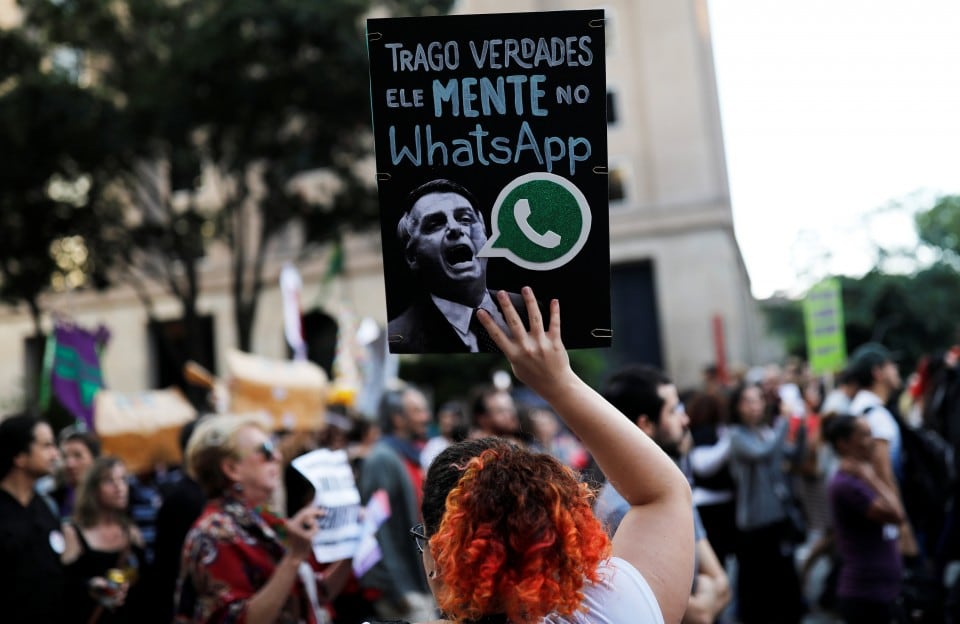Tai Nalon is the executive director of Aos Fatos, a Brazilian fact-checking organization.
RIO DE JANEIRO — Brazil’s presidential election, which ushered the far-right candidate and former military captain Jair Bolsonaro into office, followed a familiar pattern: a populist strongman who rode a wave of anger and resentment to power. But as recent revelations have exposed, Bolsonaro may have also benefited from elaborate disinformation campaigns, possibly linked to the president-elect himself.
As the Brazilian newspaper Folha de S.Paulo reported on Oct. 18, several companies supporting Bolsonaro, such as the department store Havan, spent millions of dollars to blast targeted messages on WhatsApp against his opponent, the leftist Fernando Haddad. The plan was, as Folha reported, to infest WhatsApp with inflammatory rumors the week prior to the run-off election. Época magazine reported a week later that paid activists and Bolsonaro supporters collaborated to send fake news blasts, potentially using illegally-acquired phone lists. They may have also used foreign cell phone chips to obscure their location and circumvent WhatsApp’s spamming restrictions. (Brazilian political campaigns are forbidden from receiving financial support from the private sector and from buying voter contact information from third parties.)
These reports not only confirm the damage that online technology can do to fragile democracies like Brazil’s but also illustrate how efforts by Facebook, Twitter and other public social media platforms to crack down on fake news are driving misinformation “underground,” into end-to-end encrypted channels like WhatsApp where it is harder to track.
To get a sense of what kinds of misinformation were circulated on WhatsApp during Brazil’s election season, Aos Fatos, the fact-checking organization that I lead, crowdsourced from over 6,000 WhatsApp users more than 700 false or misleading posts being shared on the app. These rumors distorted at least four key categories of information: statements by political candidates, news of electronic voting and legislation, the nature of protests and the outcomes of opinion polls. These messages were largely aimed at right-leaning political groups, Catholic and evangelical churches, trade and business associations, and military groups.
There were widespread false reports, for example, of how the Venezuelan government hacked Brazil’s electronic voting system and of how Bolsonaro’s rival, Haddad, handed out baby bottles with penis-shaped tops at schools to combat homophobia. One of Bolsonaro’s own sons, Flávio, helped spread such rumors. On Oct. 7, the day of the first round of presidential voting, he tweeted a video that had already been zinging around WhatsApp falsely claiming that the Brazilian voting system was rigged to automatically give all votes to Haddad. When the video was later debunked, Flávio subsequently deleted his tweet, but the damage was done. At least 800,000 people shared the video on Facebook and Twitter. Because of encryption, however, we don’t know how many of WhatsApp’s 120 million active users in Brazil saw it.
To shed some light on voter reactions to disinformation on WhatsApp, Aos Fatos partnered with the International Center for Journalists to survey users. We found that one in four Internet users in Brazil uses WhatsApp weekly to find information about current events. And of those who indicated that WhatsApp is one of their main news sources, the majority — over 60 percent — said they “sometimes trust” the information they see there, while 24 percent admitted that they never do. Roughly 16 percent said they “often trust” news on the app.
So what is Facebook and WhatsApp doing about fake news? Since May, Facebook has partnered with fact-checking organizations in Brazil, such as Aos Fatos, in order to downrank content flagged as fake or manipulated and to warn social media users that the content they might be engaging with includes doctored images and videos or links to low-quality websites. Facebook claims that this method has reduced the organic distribution of fake news in the United States by up to 80 percent. (The company has not released data about Brazil.)
This fact-checking effort, however, has not been applied to WhatsApp. For its part, WhatsApp claims it counteracts the spread of fake news on its channels with its “best-in-class spam detection technology,” which “spots accounts that engage in abnormal or automated behavior so they can’t be used to spread spam or misinformation.” Unfortunately, detecting spam isn’t enough to counter disinformation, and as seen in Brazil’s case, spam detectors can be circumvented. WhatsApp needs to create built-in fact-checking tools in order to tackle fake news.
WhatsApp can do so by working with fact checkers to provide not only fact-checked content but also tools to help people learn how to fact check on their own. So far, the company doesn’t seem eager to partner with fact checkers, ignoring Aos Fatos’ request for partnerships to develop, for instance, chatbots that give people fact-checking tips. Aos Fato’s team has already developed this kind of technology through a partnership with Facebook called Fátima.
As Bolsonaro prepares to take office, checking the facts on fake news and disinformation is essential. Facebook’s decision to hire non-partisan, third-party fact-checkers like Aos Fato is not a perfect solution, but it is a step in the right direction. Still, the fact is that without the cooperation of all social media platforms to combat disinformation, including WhatsApp, fake news will migrate and find a new platform on which to flourish.
This was produced by The WorldPost, a partnership of the Berggruen Instituteand The Washington Post.




